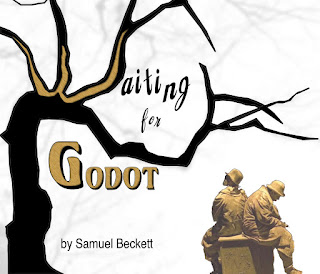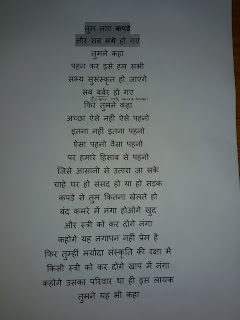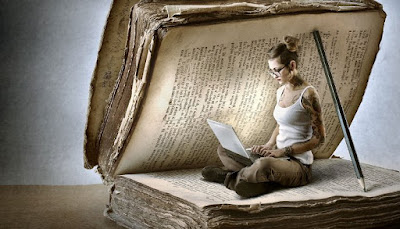Waiting for ..............?
 |
| To see original task click on the image. |
Waiting for Godot.. Not anyone else... ;-)
Waiting for Godot is a play written by Samuel Beckett. It is originally written in French language. First performed on the stage on January 9,1953. It has only five characters: Vladimir, Estragon, Lucky, Pozzo and Boy. Genre of the play is tragicomedy. It is two Act's play.
Here I am discussing my observations of the play...
- As the play starts there is one tree and a stone nearby. The tree is almost dried. Here are two photographs to compare:
In one Picture there is a rising sun which gives hope to the two persons who are longing. And in the second picture only two leaves are there which suggests ray of hope.
- The whole day of Vladimir and Estragon goes in waiting for the unknown person namely Godot. Night comes.
- In the movie version of the play the director Michel Lindsay-Hogg starts the movie with debris all around, which suggests WW-II.
- The play starts with the dialogues;
- ESTRAGON:
- (giving up again). Nothing to be done.
- VLADIMIR:
- (advancing with short, stiff strides, legs wide apart). I'm beginning to come round to that opinion. All my life I've tried to put it from me, saying Vladimir, be reasonable, you haven't yet tried everything. And I resumed the struggle. (He broods, musing on the struggle. Turning to Estragon.) So there you are again.
Itself says the theme of the play which is "Nothingness".
- The person who has played a role of Vladimir, says that the play is positive not negative. I am agree with his point. Because the play is showing the reality of human life. And accepting the reality is always positive not negative.
- In the play Vladimir is constantly playing with his hat, which suggests intellectuality. And Estragon is playing with his boots, which suggests material life.
- Lucky is a slave of Pozzo. Pozzo is treating him very rudely. This type of obedience is unbelievable at some extent. But if you see our blind faith in God is equally unnatural like Pozzo-Lucky relationship.
- The main theme of the play is not Godot, but "Waiting"...
- Play like this are better understood by reading not by watching. Because we can read it as per our own speed. In movie version it goes on very speedy. That doesn't clear some dialogues in proper way. So this type of plays should be read rather than act.
- There are three sequences in the play:
- Vladimir-Estragon passing time in questions
- Pozzo-Lucky episode in both acts
- Conversation of Vladimir with the Boy.
If the choice is given that which you like the most, then I will say that I like none.
- The play is showing the meaningless life. I feel the same when screening was going on. Everyone is waiting for something in life that will never come(like Vladimir and Estragon waiting for Godot). Existentialism is also focusing on the meaning of life which is very well expressed in the play.
- Vladimir and Estragon once talk about hanging themselves on the tree. But they postponed their idea because they were worried that if one will hang himself and the bough of the tree will fall down then another one will not be able to do the same and will remain alone there. Existentialism also talks about suicide that if everyone will think to do suicide, all will defer in their artistic way of doing suicide. And also frighten to be alone.
- The play was just written after WW II. So the characters are symbolizing the nations like; Vladimir as Russia, Estragon as France, Pozzo as Italy and Lucky as England. Pozzo here showing mastery over Lucky that represents the Hitler's capitalism. As Italy was blamed to be the reason of WW II. There Hitler raised and took his revenge. That is shown here.
- In the end of both acts the conversation goes on in similar situation. But their difference is that in first act their waiting doesn't end, and in second act their waiting ends because the Boy came in place of Godot and returns with the message of Vladimir and Estragon to give to Godot.
Waiting..







Comments
Post a Comment